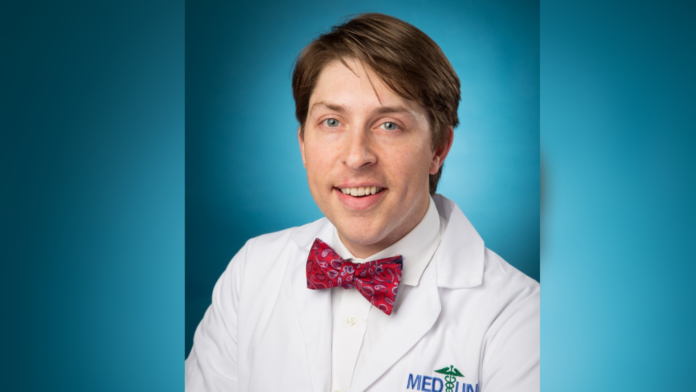Outings to the grocery store and football games often lead to “curbside consults” for Dr. Daniel Gordon. Born and raised in Hartwell, he returned to his hometown after finishing his medical training.
Dr. Gordon, who was named Georgia Primary Care Physician of the Year by the Georgia Primary Care Association this spring, said he loves the variety of his work and finds joy in helping his patients become healthier and happier.
He earned his undergraduate degree at Valdosta State University and decided Mercer University was the best fit for his medical education. He attended courses on the Savannah campus and in 2014 became one of the first graduates of the School of Medicine’s Primary Care Accelerated Track Program, a three-year curriculum that prepares students for early entry into a traditional primary care residency.
Dr. Gordon always knew he wanted to be a primary care physician in a rural community. Observing his own doctors growing up, that career focus resonated with him. Being a primary care doctor would allow him to have more of a positive impact than any other specialty, he said. He knew Hartwell needed more primary care physicians, and it was his home and where he wanted to raise his family. He and wife Paige now have four children, ages 3 to 14.

Since completing his residency at Memorial Health University Medical Center in Savannah, Dr. Gordon has worked at MedLink Georgia’s primary care clinic in Hartwell. He also provides inpatient care for newborns and adults at St. Mary’s Sacred Heart Hospital in Lavonia. Some of his patients have known him all his life and call him by his first name.
There’s a lot of variety in his work as he sees pediatric, adult and geriatric patients; provides intensive care unit, inpatient and palliative care; performs procedures; and provides addiction and mental health treatment. A third of his patients don’t have insurance, so it’s important to be able to provide advanced care since they may not have the means to see a specialist, he said.
“Having access to a primary care doctor can extend their life by years,” Dr. Gordon said. “I just feel very fulfilled in my work knowing that it’s part of making the biggest difference for people in their longevity. Now that I’ve been in practice for five years on my own, I’m starting to see how access to primary care with incremental steps leads to better health and happier people, and it brings me a lot of joy.”
He likes being able to offer unique insights and approaches to help his patients better understand their health and how certain factors affect their bodies. Once they “get it,” they can often make changes to significantly improve their health.
“I like seeing the big picture. I like seeing the little picture,” he said. “I like explaining to patients some complicated information in easy-to-understand analogies. I really enjoy educating my patients and making sure they know they’re the most important part of the treatment plan.”
Dr. Gordon is also passionate about expanding the primary care workforce, and he’s been growing in his role as an educator for nurse practitioners and medical students. In 2016, he received the Excellence in Graduate Medical Education Award from the American Academy of Family Physicians.
“I’m trying to make sure that’s part of what I do in life, to help students know the joy and the importance of going into primary care,” he said. “It’s the most value you can provide to patients. It can be life-changing to give people access to that. There’s really a lot of joy in general in primary care. There’s a holistic happy vibe, so to speak.”










